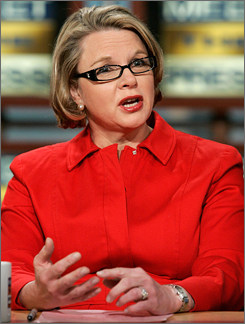
Education sec’y: No Child act needs no changes
As contentious law faces renewal, Spellings calls it ‘99.9 percent pure’
Education Secretary Margaret Spellings said Wednesday the No Child Left Behind Act is close to perfect and needs little change as its first major update draws near.
“I talk about No Child Left Behind like Ivory soap: It’s 99.9 percent pure or something,” Spellings told reporters. “There’s not much needed in the way of change.”
Spellings’ comments signal what amounts to the Bush administration’s starting position as the law comes up for renewal. That is scheduled to happen as soon as next year.
It is unsurprising that Spellings strongly supports the law. She helped craft it as President Bush’s domestic policy chief and now enforces it as the top education official.
Yet her view that the law needs little change is notable because it differs so sharply from others with a stake, including many teachers, school administrators and lawmakers.
Already, the House education committee is holding hearings on how to improve the law. So is a prominent bipartisan commission, which is touring the nation to gather opinions.
Educators urge basic changes
More than 80 organizations have signed a statement urging fundamental changes, in areas such as how student progress is measured and how schools are penalized when they fall short. And the National Conference of State Legislatures has given the law a scathing rebuke.
“You cannot ignore reality,” said Reg Weaver, president of the National Education Association, the largest teachers union in the country.
“The reality is that poll after poll speaks to the concerns that people have,” Weaver said. “They are not arguing with the goals. They are not arguing with accountability. But they say something needs to be done to fix this law.”
Signed by Bush in 2002, the law is widely considered the most significant federal education act since Congress approved its original version in 1965.
It aims to ensure that all children can read and do math at grade level by 2014, an aspiration that has placed unprecedented demands on schools. The law requires states to increase testing, raise teacher quality and give more attention to minority children.
Poor schools that get federal aid but don’t make enough progress face consequences.
Flexibility wins her praise
Spellings has made her mark as secretary by enforcing the law with flexibility.
In areas such as tutoring and testing, she has approved experiments to see what may work better — an approach that has won her praise.
“I think it would be foolhardy for me to sit up here and just say ‘we’re not going to react to anything that we’re learning over time,’ ” she said in an interview with reporters at the Education Department.
Spellings said her job is to present Congress with good data to help lawmakers do their job. She said she is open-minded about ways to improve the law.
But when asked if she meant the law is truly “99.9 percent” close to working properly, she said, “I think it is that close.”
She pointed as much to attitudes as test scores.
Now, she said, states and schools are debating how better to help children with limited English skills and students with disabilities.
“Just the level of sophistication of the conversation around these issues is, to me, the big news out of No Child Left Behind,” she said.
Margaret Spellings
Secretary of Education
Margaret Spellings is the U.S. Secretary of Education. As the first mother of school-aged children to serve as Education Secretary, Spellings has a special appreciation for the hopes and concerns of American families.
Secretary Spellings is working to ensure that every young American has the knowledge and skills to succeed in the 21st century. She has partnered with states to implement and enforce the No Child Left Behind Act, which commits our schools to bringing all students up to grade level or better in reading and math by 2014. The law has led to rising test scores and shrinking achievement gaps in states across the country.
Secretary Spellings has been a leader in reform to make education more innovative and responsive. She supported teachers with new financial incentives for gains in student achievement and parents with new educational choices and options. She announced new rules to ensure that students with disabilities and English language learners are educated to the highest standards. She also proposed a landmark Plan for Higher Education that would improve accessibility, affordability and accountability.
Secretary Spellings believes we must not retreat from the world in the face of increased competition. She is leading the effort to pass President Bush’s American Competitiveness Initiative, which would strengthen math and science instruction and encourage high schools to offer more rigorous and advanced coursework. She worked to implement Academic Competitiveness and National SMART grants, which are providing millions of dollars to low-income students who major in math, science, or critical foreign languages.
Prior to her tenure as Education Secretary, Spellings served as Assistant to the President for Domestic Policy, where she helped create the No Child Left Behind Act and crafted policies on education, immigration, health care, labor, transportation, justice, housing, and other elements of the President's domestic agenda. Previously, Spellings worked for six years as Senior Advisor to Governor George W. Bush with responsibility for developing and implementing the Governor's education reforms and policies. From the White House and the Statehouse to the school board and college campus, Spellings has been involved with education policy at every level.

No comments:
Post a Comment